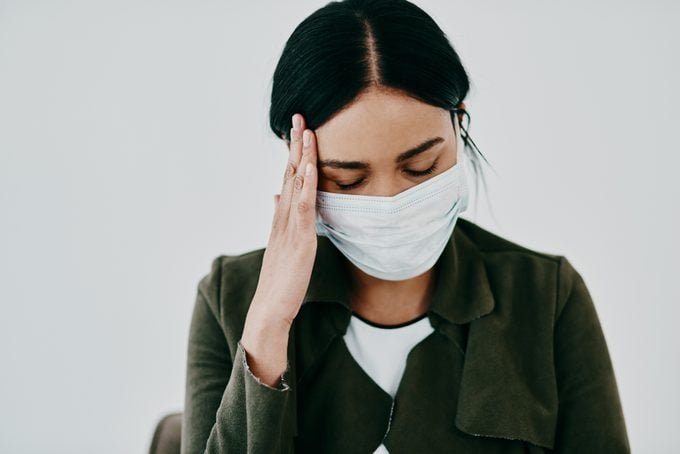4 Worst Symptoms that Linger After Covid-19
Updated: Jun. 16, 2021
Coronavirus symptoms, from fatigue to brain fog, can linger even after the virus is gone. Here's what some "long haulers," or Covid-19 survivors, are experiencing.

It’s agony enough to experience Covid-19 with its chills, fever, and other unpleasant symptoms. Now experts are discovering that some people who have recovered from coronavirus have lingering effects that last for weeks or even months.
Scott Krakower, DO, a psychiatrist in Glen Oaks, New York, is a case in point. The 40-year-old spent much of April sick with a violent cough, trouble swallowing, and chills so extreme he kept taking hot showers. He tested negative for the virus at the end of May. It’s now early August and, while the virus itself may be gone, he still has a recurring cough, fatigue, and weakness in his voice. He doesn’t plan to return to work until September 2020 at the earliest. (This is how you can avoid coronavirus at work.)
Dr. Krakower is one of a growing number of “long haulers” who report symptoms of Covid-19 long after the virus has departed. “This tells us that this virus is a little different than others,” says Todd W. Rice, MD, director of the medical ICU at Vanderbilt University in Nashville. “It probably causes more damage and because of that it has longer residual effects.” (Find out if you can get coronavirus twice.)
This is what we know about symptoms of Covid-19 that don’t go away quickly.
How many people have lingering coronavirus symptoms?
No one knows exactly how many people have persistent symptoms of Covid-19. In a July 24 Morbidity and Mortality Weekly Report (MMWR), the Centers for Disease Control and Prevention (CDC) reported that 35 percent of adult patients, most of whom had not been in the hospital, had not returned to their “usual state of health” two to three weeks after testing positive. Note that two to three weeks after any viral infection can be expected. And cough can linger up to three weeks, not just with Covid-19.
An Italian study published July 9 in JAMA found that 87.4 percent of patients who were hospitalized still had at least one lingering symptom 60 days out from their first symptom. (Learn more about the people at highest risk from Covid-19.)
Many people who report continuing symptoms are older or have underlying health conditions—the same factors that put you at risk for a more serious case of Covid-19, like heart disease or lung disease. In the CDC report, the more chronic conditions a person had, the more likely they were to say they weren’t fully recovered. After 55 days in the hospital, this man who lost his leg and toes due to Covid-19 still has a long recovery ahead.
On the other hand, says Prathit Kulkarni, MD, assistant professor of medicine at Baylor College of Medicine, “persistent symptoms can exist even with milder forms of Covid-19.” The severity of the illness may also play a role, with those needing to be hospitalized appearing more likely to have lingering complications, says Dr. Rice. (Did you have coronavirus? Here are the Covid-19 signs you may have.)
Fatigue is common
In the JAMA study, more than half (53.1 percent) of participants reported fatigue two months later, making it the most common lingering symptom. Fatigue also ranked high in the CDC report as well as in a survey of 1,567 Covid-19 survivors conducted by Indiana University and the Survivor Corps, a grassroots organization that includes people who often refer to themselves as long haulers. “That fatigue is fairly severe,” says Dr. Rice. “It’s disabling fatigue.”
The infection “seems to last a little longer with Covid-19 than it does with flu or other respiratory illnesses and is a little bit more prevalent,” says Dr. Rice. By contrast, the CDC notes, more than 90 percent of people with the flu recover within two weeks of a positive test result. (This is what you need to know about at-home Covid-19 tests.)
Trouble breathing
Shortness of breath and trouble breathing were among the most common continuing symptoms reported by survivors. They’re also, of course, key symptoms of a virus, which primarily attacks the respiratory symptom. In particular, they’re hallmarks of acute respiratory distress syndrome (ARDS), which is when fluid builds in the lungs, preventing you from getting enough oxygen. By one estimate from The Centre for Evidence-Based Medicine at Oxford University, 15 percent of people with Covid-19 develop ARDS and may need oxygen or mechanical ventilation. Note that prolonged difficulty breathing after an infection is not likely to be ARDS as these cases would generally be in those hospitalized.
Although we don’t have that much data on long-term complications from Covid-19 itself, “based on other diseases which require the ICU, we know that a small percentage of people will have long-term lung damage and fibrosis and scarring from being in the ICU,” says Dr. Rice. (Find out the link between vaping and coronavirus.)
Aches and pains
Recovering patients have also reported muscle and body aches, says Robert Glatter, MD, an emergency physician at Lenox Hill Hospital in New York City who treated Dr. Krakower. Overall, more than a quarter (26.5 percent) of respondents in the Indiana University survey said they had symptoms that caused pain. Not just muscle or body aches but also joint pain, headache, chest pain, sore throat, low back pain, nerve pain, and kidney pain.
The survey notes that patients’ comments “show that this pain can be extreme and difficult to manage” and that doctors often didn’t know how to treat them. (Here are the coronavirus precautions doctors take to protect themselves.)

Brain fog
Covid-19 survivors have also reported difficulty concentrating or focusing and short attention spans. “There are a host of nonspecific symptoms,” says Elisa Choi, MD, a member of the Public Health Committee of the Infectious Diseases Society of America. (Read more about cognitive symptoms of Covid-19.)
But rather than being a lingering symptom of Covid-19, brain fog may actually be part of a post-viral syndrome that can be seen with other viruses, says Dr. Choi.
“After any illness, it’s not uncommon to feel not quite as sharp afterward,” she explains. “Your body has been through this tumultuous phase so, afterward, you might be exhausted, but also may not be sleeping as well. You recover from the acute infection or illness but it’s almost like the body is still trying to recover back to its baseline.”
Experts noted a post-viral fatigue syndrome after SARS and MERS, the two other potentially life-threatening illnesses caused by coronaviruses that caused outbreaks in 2003 and 2012, according to the American Heart Association. (Here’s how SARS, MERS, and Covid-19 are related, and how they are different.)
Why do some coronavirus symptoms linger?
No one knows what causes these persistent symptoms, but there are theories. One is that the immune system response is still raging even though the virus is gone.
It’s possible the same dysfunction that makes the infection so dangerous is contributing to lingering symptoms, says Dr. Glatter. Another possible explanation is inflammation, with inflammation lingering and having a continued effect on different organs, says Dr. Rice.
The virus may also expose previously latent conditions. “It’s possible that infection with Covid-19 may be unmasking a previously unreported or undiagnosed chronic condition,” says Dr. Choi.
For instance, a young adult may not have been actually diagnosed with asthma previously, but perhaps they had a predisposition to asthma, and becoming infected with Covid-19 leads to asthmatic symptoms.
How lingering coronavirus symptoms are treated
The one treatment that has been approved for Covid-19—remdesivir—doesn’t do any good here because it directly attacks the virus and the virus has gone away, says Dr. Rice.
Steroids and other anti-inflammatory drugs “to try to decrease that inflammation seems to improve symptoms and organ damage,” says Dr. Rice.
When Dr. Krakower came to the emergency room unable to swallow, Dr. Glatter treated him with steroids which seemed to help. He’s still using a steroid inhaler, which can help reduce inflammation in airways. These type of inhalers are often used to treat people with asthma.
Do people ever recovery fully? This is another question with no clear answer. SARS-CoV-2, the virus that causes Covid-19, has only been around for about six months so there isn’t any long term data. But, even long haulers seem to be showing an arc in the right direction, says Dr. Rice.
Dr. Krakower believes he’s on the mend from the days when he was coughing blood and couldn’t swallow. He’s even seen an improvement from two weeks ago. “I still have moments where I’m short of breath [but] this is much better than I was,” he says.
It’s just not clear at this point if everyone will recover fully. “The real question is how long is this going to persist,” says Dr. Kulkarni. (Next, read about the promising Covid-19 vaccines.)


















